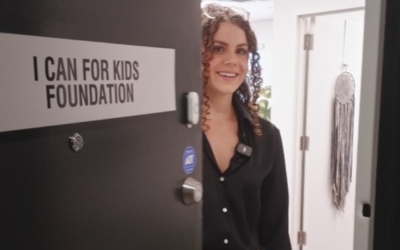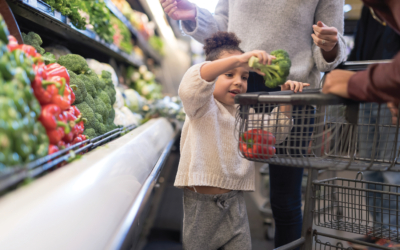I Can for Kids (iCAN) aims to create a world where all children have an equal opportunity to thrive. And what better way to achieve this than by empowering parents to strengthen the environment their kids need for optimal growth, development, and resilience. In this blog, we describe how our grocery gift card program offers incredible potential to boost much more than a child’s diet and nutrition.
What’s the link between food insecurity and child development?
It’s quite clear that food insecurity impacts a child’s mental health and is linked to childhood adversity. However, there is a significant lack of consistency and quality among the body of research that focuses on food insecurity during childhood development. This makes it somewhat challenging to compare or generalize results between studies. That said, a prevailing narrative emerges from research in high-income countries: children raised in food-insecure homes are at much higher risk of grappling with behavioural, academic, and emotional challenges.
Why does food insecurity impact child development?
We examined the conclusions of three recent review articles that evaluate and summarize the results of dozens of studies. The general consensus is that food insecurity hinders kids’ ability to attain their full emotional, cognitive, and social potential through several key pathways:
- parents often lack enough capacity to engage in consistent and nurturing interactions with their children when they have to expend great amounts of time and energy ensuring their families have enough to eat
- children face a higher risk of poor nutrition which negatively impacts growth, health, and brain development
- under heavy emotional burden, children become easily distracted from participating in critical life experiences, such as friendships, play, creative activities, sports, and school
What are the specific impacts of food insecurity on child development?
The first of the research reviews summarizes studies that examined key markers of development among food-insecure children under five years old. The authors uncovered the following trends among young kids who experience food insecurity:
- smaller gains in vocabulary
- weaker math skills
- more behavioural struggles
The second review focuses on the social and cognitive development of food-insecure children under 12 years old. The authors highlight how food insecurity is linked to:
- decreased reading, memory, and math scores
- weaker social skills (especially for boys)
- more behaviour problems, intensified behaviour problems, and poor self-control (especially when kids are exposed to a high level of uncertainty due to ongoing transitions into and out of food insecurity over time)
- less ability to regulate difficult emotions and self-esteem (especially when children are exposed to persistent food insecurity over time)
The final review looks at data on developmental patterns during infancy through adolescence among children living in the United States, the United Kingdom, Australia, and Canada. The results show that in comparison to food-secure children:
- infants and toddlers are at increased risk of poor emotional attachment, impaired cognitive development, and poor physical health when raised in a food-insecure home
- food-insecure students of all ages exhibit more anxiety, depression, aggressive behaviour, and difficulty focusing on schoolwork
- students from kindergarten through elementary grades are more likely to miss school and perform lower on reading and math skills if they live in a food-insecure home
- food-insecure teenagers experience greater social isolation, more frequent suspension from school, elevated risk for substance use, and much higher levels of suicidal ideation
How do grocery gift cards help?
Across our network of agency partners, iCAN currently targets grocery gift cards to food-insecure households through 54 unique programs in Calgary, many of which focus on parenting and family well-being. From our research, we know that our approach alleviates financial strain and relieves psychological stress among everyone living in the same household. Parents tell us that access to our grocery gift cards enables them to minimize many threats to their children’s physical, social, and emotional health by enabling them to:
- pack regular lunches to enjoy with friends at school
- improve relationships with peers by eating similar foods
- access products that don’t trigger food allergies and sensitivities
- eat enough protein and energy to engage in activities, exercise, and sports
- enjoy birthdays and holiday meals with family and friends
- adhere to diet recommendations required to treat health conditions
- afford baby formula and fortified infant cereals
To highlight the considerable impact of your donations, here are a few tell-tale messages that we’ve received from parents about the way your support helps their children thrive:
- “The grocery gift cards have been a lifeline for my low-income family, ensuring we have nutritious meals and essentials for our 3-year-old and 8-month-old. Since rent prices are through the roof and formula is getting even more expensive, the gift cards are even more crucial. The relief and peace of mind that come from knowing we can rely on this support are immeasurable. Your generosity has made a significant impact on our lives, and we are forever grateful.”
- “I am a mother of four who lives with my husband in a low-cost housing unit on a fixed income. My husband lost his job and there is still no work for him. Because of our financial situation, there are only a few dollars left after paying all the bills. We have tried our best to provide basic needs for our family and I have noticed that it is hard to access services for food. But when we have little food in the fridge, I have no choice but to reach out for support. By accessing the support from I Can for Kids, we are now able to purchase fresh fruit and vegetables for our children. I know that it is a privilege to have help. It may seem like a small act to you, but to us it makes all the difference between food on our table or skipping another meal. The biggest area of concern for families like ours is: Do we have enough money to make lunches for our children and give them a decent breakfast? Thank you from the bottom of my heart!
- “Sometimes the children come home and say their friends complained that they don’t like the African food they bring to school. That has a negative impact on me, but the grocery gift cards are a major relief. I know that my children can go to school now with Canadian food.”
When you donate today, you empower food-insecure families to raise healthy, active, and resilient kids.
To join iCAN’s expanding list of donors, sponsors, and champions, check out the different ways you can get involved or donate.
To learn more about I Can for Kids and their unique approach to childhood food insecurity, visit www.icanforkids.ca
About Donald Barker
Donald Barker has worked as a registered dietitian for more than 25 years. He also has a professional background in communications and has long advocated for populations who face adverse, unjust, or systemic barriers that lead to higher rates of poor social, mental, emotional, and physical health outcomes. Donald currently volunteers as an Advisor with iCAN to support our transition towards evidence-based approaches that help improve the well-being of children in Calgary who live in low-income and food-insecure households.
About I Can for Kids Foundation
I Can for Kids works closely with multiple agency partners to target and distribute grocery gift cards to food-insecure families who are most in need. The iCAN grocery gift card program is a more dignified and inclusive approach to dealing with food insecurity, allowing families to shop where everyone else shops and to choose foods that are appropriate for their health and cultural needs. Explore their website to discover more about iCAN’s impact over the years.
For more information and media inquiries, please contact iCAN Executive Director, Bobbi Turko at bobbi@icanforkids.ca.




